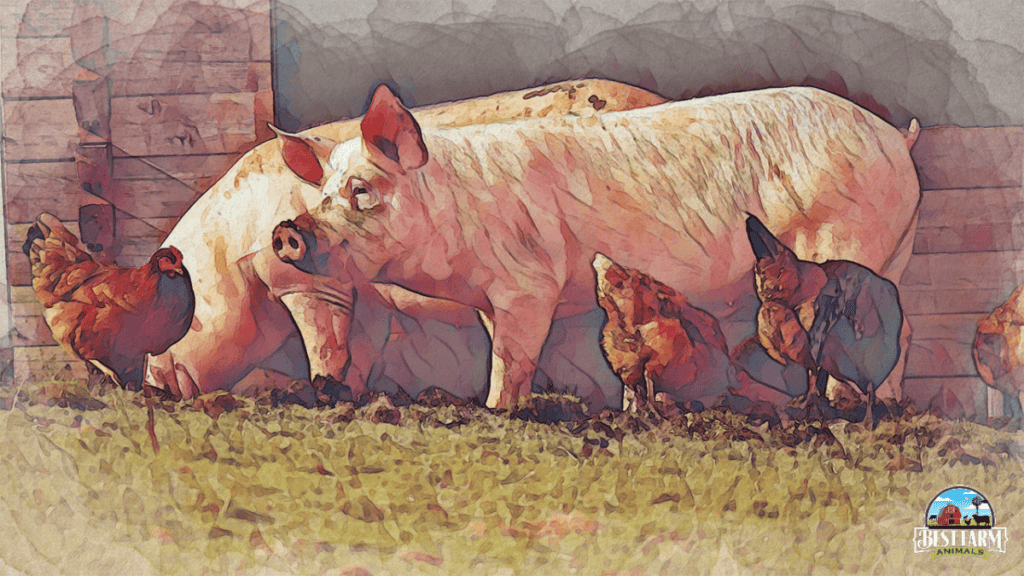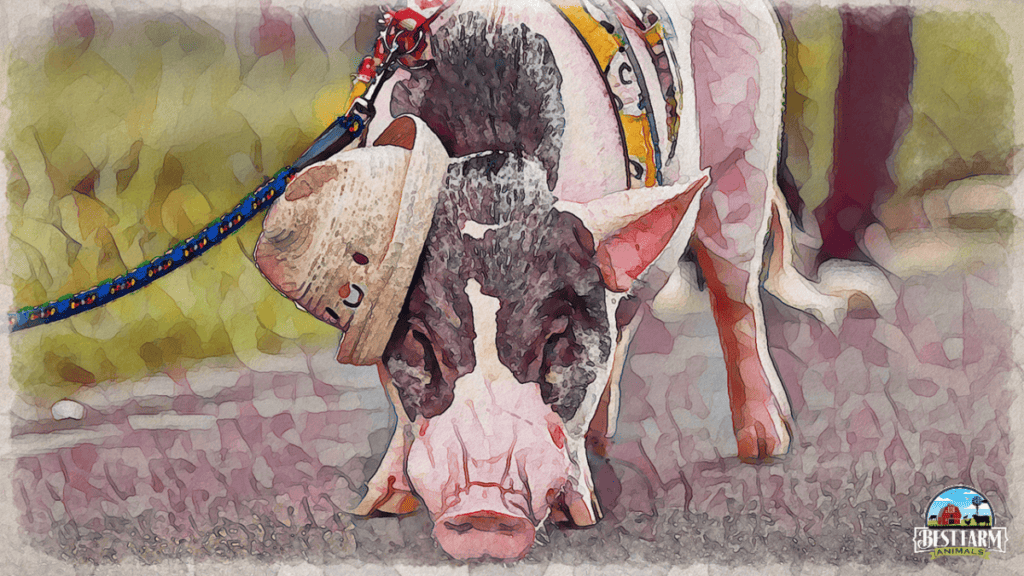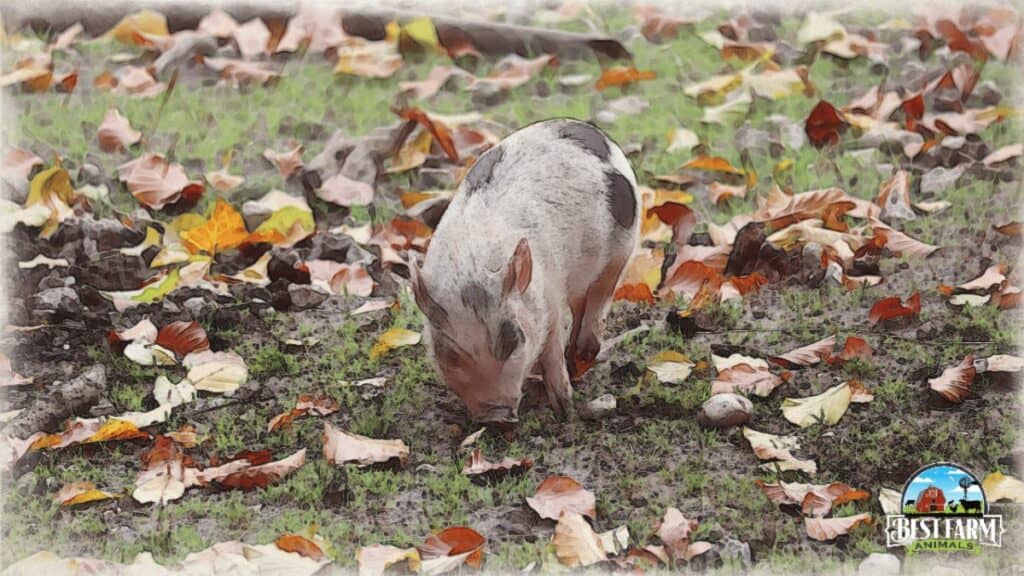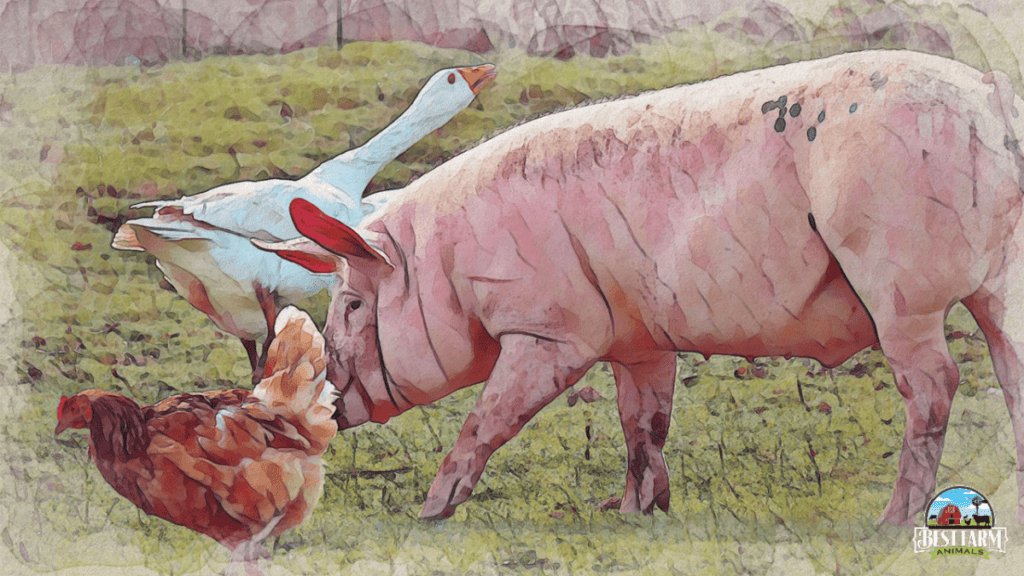Included in this article: Table of Contents
Pigs and Chickens Together- Is it a Good Idea?
If you are raising chickens and pigs together or starting a small or hobby farm, you may be wondering if pigs and chickens can be housed together.
Can chickens and pigs live together?
Pigs and chickens can live together if you do it right. Closely monitor both chickens and pigs for the first few months to make sure the chickens are safe from being eaten by the pigs, or the pigs getting sick from the chickens.
It also helps to raise your piglets around the chickens. Some issues can arise, but if you take appropriate measures, it is a situation that can be beneficial.
I have spent most of my adult life believing that it was impossible to keep chickens with pigs because the pigs would go after the chickens.
Pigs are omnivores. They eat not only plants but also meat. This means that in some cases, pigs can become aggressive. They have on occasion been aggressive toward their human owners. In other situations, they can be aggressive toward other animals as well.
But, as I have learned recently, this is not necessarily the case, and there can be benefits on both sides to this unlikely arrangement.

If you want to house pigs and chickens together, there are a few things you should be aware of to ensure the safety of both species.
Benefits to Raising Pigs with Chickens
There are a number of benefits to letting the chickens hang out with the pigs, assuming appropriate measures are taken to ensure the safety of the chickens.
Parasite Control:
Pigs and chickens have different parasite profiles and feeding habits. Chickens often find insects, worms, and pests left behind by pigs, and they may even pick lice off the pigs’ bodies.
On the flip side, pigs root and turn over the soil, pushing parasites into the ground, benefiting chickens. This mutual interaction can help control flies and bugs as well.
Chickens will go after any bugs they find around the pigs, including maggots that could turn into biting flies. This helps to reduce the risk of the pigs getting bitten, which could cause issues with them.
Another advantage is that pigskin gets itchy, especially as the mud dries on their skin.

Some chickens will decide a pig’s backs are a good place to hang out. They will help to scratch those hard to reach spots. This allows for a direct benefit from the chickens sharing their space.
Predator Control:
Pigs can help deter predators that commonly target chickens, such as hawks, coyotes, dogs, foxes, and weasels. The size and presence of pigs often keep these threats at bay.
One of the main advantages for chickens is some serious protection.
Birds of prey stay away from chickens that are housed with pigs.
Not even a hawk would be brave enough to get near a bunch of hogs to try to grab a chicken. Four-legged predators will also keep their distance because the pigs may tear them up, and their lives are not worth risking for an easy meal.
Space Saving:
Combining pigs and chickens can save space and reduce chore time.
You’ll only need to tend to one paddock, although separate feeding and egg collection areas may be necessary.
Pasture Utilization:
Grazing pigs and chickens together can efficiently utilize pasture. Chickens scratch the ground, while pigs root and expose grubs and microorganisms.
Pigs leave behind manure and food scraps that chickens enjoy foraging through.
- Chickens can eat and take care of nuisance bugs to the pigs
- Chickens can help to scratch the hard to reach places on a pig’s back
- Pigs provide protection against birds of prey and other predators
Do Pigs Eat Chickens?
The other day, I got a call from a friend who frantically cried, “My pigs are eating my chickens! What do I do?”
Pigs eat chickens once they’re excited by the taste of the chicken’s blood. In nature, it always boils down to survival of the fittest, and unfortunately, if a pig (an omnivore) manages to catch, kill, and eat a chicken even once, they will do it again.
A pig will also eat a chicken if it feels territorial (due to hormones) or irritated by the chicken’s presence.
Pigs may eat chickens if they’re all kept together in a small living space. The pig may become stressed by the chickens scratching around them, and in response, they may attack and eat the chickens.
Boredom is another reason why pigs eat chickens. What might start as a bit of fun could end in a dead chicken. There is also the chance that a pig may accidentally trample a chicken to death because of its large size.
Out of curiosity, the pig may eat the chicken.
Combining pigs and chickens takes planning and cannot be done on the spur of the moment. Pigs are less likely to accept chickens if the pigs are already fully grown.
Some planning is required.
By planning up to a year in advance, you are giving both species their best chance at a mutually beneficial relationship that you can.
Once a pig gets a taste of chicken, it is all over. After that, a pig will almost always go after chickens. There is no changing that behavior.
That pig will immediately need to be removed from the pen with the others as it will cause it to constantly go after the chickens and, eventually, it will catch another one.
Pigs that are hungry are pigs that will seek a variety of food sources. This doesn’t apply to just wild animals either.
Ensure your pigs always have an appropriate food source and are never left hungry between meals. They are more likely to leave your chickens alone.
Plus, the chickens won’t be chased off of their feeding trough as quickly either. Once a pig does get a taste for chicken meat, you will have no choice but to separate that pig from your chickens.
Once a pig tastes chicken, it will have a taste for it and will continue to seek that as a food source.
Can Pigs and Chicks Live Together?
Very often chickens and ducks do live together successfully, but there are real dangers in the practice.
If you plan to house chickens and pigs together, take steps to ensure greater success.
Chicks are at a higher risk of being eaten or hurt by pigs because of their small size. Pigs can step on chicks and chicken have no way to fight back.
Chicks already have a higher mortality rate than chickens so I don’t recommend keeping pigs and chicks together. Keep the chicks safe in a secure cage or coop, next to the pigs so they can get used to each other.
Make sure the fencing is secure and the pigs can’t reach the chicks. You’ll also want to make sure the chicks can’t wander through the fencing to the pigs.
Hardware cloth is a great resource for securing larger fence holes for chicks.
Avoid Pigs Eating Chickens
A small pig pen gives the chickens less room to run and a more suitable target for a pig that decides to hunt. This is not ideal if you want to allow chickens around your pigs.
When it comes to housing pigs and chickens together, one of the biggest mistakes a farmer or a homesteader can make is not giving an appropriate amount of room for both the pigs and the chickens.
Instead, you would want to have an open foraging area for the pigs, preferably with some woods they can forage in.

The additional room and lack of corners give the chickens more chances to get away if a pig gets in the mood for chicken for supper.
It also makes it too much work for a pig to chase after the chickens.
The better option instead of a pen is to fence off half to a full acre for them to move around in.
By eliminating the chance of a chicken getting cornered, you have reduced the risk of the pigs going after any of the chickens, at least in any serious type of way.
Keep in mind that not much will stop a determined pig if it wants to break free. For this reason, electrical fences are the best option for keeping your pigs contained.

Due to the lack of grounding, if a chicken lands on the wires, it is safe from being electrocuted. The connection between the wires and the ground made by a body will cause the shock.
So, if you have a lower wire that your chickens can touch while on the ground, this poses an issue. Chickens and pigs need different voltages to be safe. Check out this article on electrical fences for more information.
Will Chickens Eat Pigs?
Chickens will not eat live pigs unless the pig is already dead in the stall.
Chickens do not have the ability to fight a pig and will not attack a live pig. However, chickens are attracted to the color red so if a pig is injured, there is a chance a chicken will peck at the injury if the pig is unable to fight back.
Take note, you should not have sick or dead pigs in a pen with chickens or other pigs as this will pose a serious health risk to the chickens and pigs sharing the pen and introduce bacteria to them.
Chickens And Pigs Together FAQs
While housing chickens and pigs together may seem like a good idea, some genuine risks are involved, such as accidental injuries (or deaths), the spread of disease, and fighting.
Monitor the shared living area carefully to avoid these situations.
Can Pigs And Chickens Mate?
It is not physically or biologically possible for pigs and chickens to mate. Pigs are viviparous mammals which means they give birth to live young.

On the other hand, chickens are avian and oviparous, which means they lay eggs. If a pig attempted to mount a chicken, they would likely trample the chicken to death.
Their genes won’t produce offspring.
Are Pigs And Chickens Omnivores?
Pigs and chickens are omnivores. A pig is known as an omnivorous scavenger and will eat almost anything they come across, from fruit to small birds or mice.
A chicken will also eat almost anything they come across while foraging, from grains to worms. Although chickens don’t eat much meat, occasionally, they may eat insects, lizards, and mice.
Can A Pig Get Pregnant By A Rooster?
A pig can’t get pregnant by a rooster. A pig and a rooster are two different species. Physically and biologically, the act of mating would be impossible. If a rooster tries to mount a pig, the pig will react very badly.
If a pig tried to mount a rooster, the rooster would be seriously injured and possibly die.
Can Ducks And Chickens Live Together?
Fully grown ducks and chickens can live together. However, growing ducks will require a more nutrient-dense diet.
Just because these two species have similar physical features, such as their beaks and feathers, doesn’t mean they won’t fight or try to assert dominance in their living environment. Ensure each of their needs are met.
Can KuneKune Pigs Live With Chickens?
Kunekune pigs can live with chickens. This breed of pig has a peaceful and calm temperament and gets along well with other animals. Even so, keeping an eye on the animals is essential, as Kunekune pigs can behave aggressively.
There is also a chance that the pig may accidentally injure the chicken due to the pig’s large size.
My Favorite Chicken and Duck Supplies
This list contains affiliate products. Affiliate products do not cost more but helps to support BestFarmAnimals and our goal to provide farm animal owners with accurate and helpful information.
Manna Pro Oyster Shell keeps eggs strong. Before I gave my chickens oyster shell, I had the oddest eggs, many with weak and irregular shells. Now, I don’t have an issue.
Layer Feed by Manna Pro. I like pellets rather than crumbles as my chickens eat them better and less gets wasted or scavenged by rodents. A good layer feed makes the difference in hens laying many more eggs.
My chickens love this mealworm treat, which gives added protein, something that’s great during molting and winter months.
There are many ways to feed and water your chickens. I like this food and water setup the best because it reduces waste, saves me time feeding and watering, and keeps the food fresh longer. Except, in the winter, I use a heated waterer. The only problem is the heated waterers need to be replaced every few years.
I love this chicken veggie hanger. It makes it easy to give your chickens produce from the garden and keep them occupied in the winter with a fresh head of lettuce.
These chicken toys are a hoot! They will help curb bullying and keep your chickens active, especially in the winter when hens tend to get more lethargic.
Conclusion
Keeping chickens and pigs together is definitely possible. But, if you don’t respect each animal’s specific needs, the housing setup can quickly end in tragedy.
If your pig accidentally injures a chicken and develops a taste for chicken meat, you must separate them immediately.
Even though some obvious and serious risks are involved, some excellent benefits exist, such as pest control and protection from predators within the living area.
Introduce the animals to one another slowly and ensure you give them enough space so they don’t irritate or crowd one another.
My Most Used Pig Supplies
This list contains affiliate products. Affiliate products do not cost more but helps to support BestFarmAnimals and our goal to provide farm animal owners with accurate and helpful information.
Purina Pig Chow will last well (or Mazuri is popular, but I haven’t tried it), and the stainless steel non-skid bowls that will help keep the mess down.
A pig blanket to keep her warm. This one also has bright colors and helps to provide rooting without the destruction.
Pig Harness for walking and handling your pig. There are a lot to choose from, but this one is pretty easy to use. If you want one that has a separate leash, this looks like a good one.
A large crate for keeping her safe in your house at night and when you leave the house. This is essential. You’ll also want a litterbox, and I like mine with a lid for nighttime. Pine shavings are best, and you may be able to find them in larger quantities locally.
When you have accidents, Odoban will help eliminate odors. When you are potty training, these floor pads work great for keeping your house clean while training her to go in certain places.
You’ll also want an outdoor house to keep her warm when she gets outside time, an essential part of her development.
Dewormer- Ivermectin is the primary dewormer I use, although I do rotate with a non-ivermect ingredient once so that the worms don’t get immune to it.

